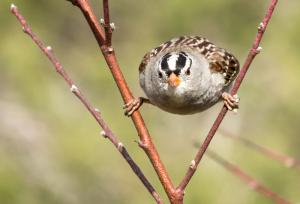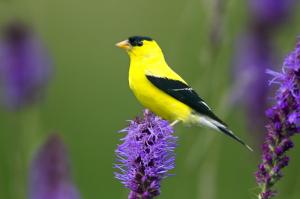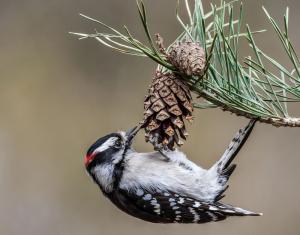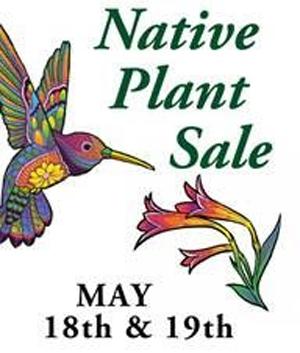In partnership with the Cornell Lab of Ornithology, BirdLife International and dozens of other organizations, the National Audubon Society is celebrating the 100th anniversary of the Migratory Bird Treaty Act, declaring 2018 as the Year of the Bird.
Each month is marked by a featured call to action, and March’s call to action was Grow Native Plants! The Audubon Society has a handy native plants database at: https://www.audubon.org/native-plants. Just plug in your zip code and find what native plants work well in your area – and the birds they attract.
More native plants mean more choices of food and shelter for native birds and other wildlife. To survive, native birds need native plants and the insects that have co-evolved with them. Large, colorful fruits feed birds and, in return, birds spread the plant’s seeds far and wide, supporting whole ecosystems.
Native plants are also important hosts for protein-rich native insects like butterfly and moth caterpillars, which nesting birds need to feed their growing chicks. For their part, birds have shaped their entire life cycles, including their migrations and feeding habits, around plant communities and the seasonal fruits and insects they serve.
Native plants are good for people, too. When you landscape with native species, you can spend more time with the birds and less time with the mower. Mowers and weed-whackers burn gasoline to the tune of 800 million gallons per year, contributing to the store of greenhouse gases and pollutants in the air. The less lawn you mow, the less air and water pollution you create. Less lawn also means less noise pollution.
According to the Environmental Protection Agency, 30 to 60 percent of fresh water in American cities is used for watering lawns. Native plants have adapted to thrive in their regional landscape, without added water or nutrients.
Cultivating vertical structure in your yard by planting many different species of herbaceous flowering plants, shrubs, and trees creates layers of vegetation that deflect pounding rains, increasing the chance for water to be absorbed by your soil before running off into storm drains and streams.
Less lawn mowing, fertilizing, and pesticide application means cleaner air and water. Homeowners apply nearly 80 million pounds of pesticides to lawns in the United States each year. Lawn chemicals can be carried by storm water runoff and wind, contaminating streams and wetlands many miles away. Native plants are often hardier than non-native ornamentals and thrive without pesticides or fertilizers.
Landscaping with native plants isn’t maintenance free—invasive weed species are an ongoing issue in any garden. But with careful landscape planning and plant selection, you can create a garden space that minimizes the ongoing input of time and money. That gives you more time to relax, enjoy the beauty and hear the songs of the birds you’ve attracted. It’s a winning situation for all!
Find more details about native plants at these articles: http://www.audubon.org/news/grow-these-native-plants-so-your-backyard-birds-can-feast
http://www.audubon.org/news/why-native-plants-are-better-birds-and-people
Strawberry Plains Audubon Center, Holly Springs, Mississippi, is gearing up for their Spring Native Plant Sale, May 18-19, 2018. It will be a great time to start special gardens that attract throngs of birds and wildlife to your land.
And don’t forget to partake of the rare opportunity to ride your horse at Strawberry Plains Audubon Center on April 7, 2018. Oak Grove Hunt hosts its annual Hunter Pace/Timed Trail Ride at SPAC, starting at 1:00 p.m., with registration at 12 noon. Lunch will be served, and riders can enjoy the 3,000 acres of hardwood forests, wetlands, native grasslands and 15 miles of trails managed by Strawberry Plains from horseback.
Find more information about the many events at Strawberry Plains Audubon Center at: http://strawberryplains.audubon.org/. Or contact Mitch Robinson at mrrobinson@audubon.org or 662-252-1155.
Find out more about the Year of the Bird and the featured call to action for each month at: http://www.audubon.org/yearofthebird
Each month is marked by a featured call to action, and March’s call to action was Grow Native Plants! The Audubon Society has a handy native plants database at: https://www.audubon.org/native-plants. Just plug in your zip code and find what native plants work well in your area – and the birds they attract.
More native plants mean more choices of food and shelter for native birds and other wildlife. To survive, native birds need native plants and the insects that have co-evolved with them. Large, colorful fruits feed birds and, in return, birds spread the plant’s seeds far and wide, supporting whole ecosystems.
Native plants are also important hosts for protein-rich native insects like butterfly and moth caterpillars, which nesting birds need to feed their growing chicks. For their part, birds have shaped their entire life cycles, including their migrations and feeding habits, around plant communities and the seasonal fruits and insects they serve.
Native plants are good for people, too. When you landscape with native species, you can spend more time with the birds and less time with the mower. Mowers and weed-whackers burn gasoline to the tune of 800 million gallons per year, contributing to the store of greenhouse gases and pollutants in the air. The less lawn you mow, the less air and water pollution you create. Less lawn also means less noise pollution.
According to the Environmental Protection Agency, 30 to 60 percent of fresh water in American cities is used for watering lawns. Native plants have adapted to thrive in their regional landscape, without added water or nutrients.
Cultivating vertical structure in your yard by planting many different species of herbaceous flowering plants, shrubs, and trees creates layers of vegetation that deflect pounding rains, increasing the chance for water to be absorbed by your soil before running off into storm drains and streams.
Less lawn mowing, fertilizing, and pesticide application means cleaner air and water. Homeowners apply nearly 80 million pounds of pesticides to lawns in the United States each year. Lawn chemicals can be carried by storm water runoff and wind, contaminating streams and wetlands many miles away. Native plants are often hardier than non-native ornamentals and thrive without pesticides or fertilizers.
Landscaping with native plants isn’t maintenance free—invasive weed species are an ongoing issue in any garden. But with careful landscape planning and plant selection, you can create a garden space that minimizes the ongoing input of time and money. That gives you more time to relax, enjoy the beauty and hear the songs of the birds you’ve attracted. It’s a winning situation for all!
Find more details about native plants at these articles: http://www.audubon.org/news/grow-these-native-plants-so-your-backyard-birds-can-feast
http://www.audubon.org/news/why-native-plants-are-better-birds-and-people
Strawberry Plains Audubon Center, Holly Springs, Mississippi, is gearing up for their Spring Native Plant Sale, May 18-19, 2018. It will be a great time to start special gardens that attract throngs of birds and wildlife to your land.
And don’t forget to partake of the rare opportunity to ride your horse at Strawberry Plains Audubon Center on April 7, 2018. Oak Grove Hunt hosts its annual Hunter Pace/Timed Trail Ride at SPAC, starting at 1:00 p.m., with registration at 12 noon. Lunch will be served, and riders can enjoy the 3,000 acres of hardwood forests, wetlands, native grasslands and 15 miles of trails managed by Strawberry Plains from horseback.
Find more information about the many events at Strawberry Plains Audubon Center at: http://strawberryplains.audubon.org/. Or contact Mitch Robinson at mrrobinson@audubon.org or 662-252-1155.
Find out more about the Year of the Bird and the featured call to action for each month at: http://www.audubon.org/yearofthebird










